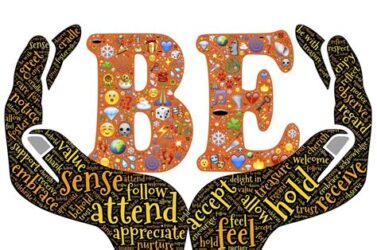A Jewish matchmaker discusses cultivating your mindfulness IQ
The word “mindfulness” gets tossed around a lot these days. I’ve always equated it with being “in the moment”, “present”, and “in the now” – but outside of those terms, I’ve not given being mindful or more specifically, being mindful in relationships all that much examination.
But recently I had a bit of an epiphany about what being mindful in relationships would look like, and this month’s blog felt like a good space in which to share my thoughts and revelation.
Who Are You?
I’m often taken aback by how many different versions of “Sara Malamud” there are in this world. And I don’t mean different people who share my name. I mean different versions of me. How can this be, you ask? It occurs because every single person who knows me or has ever met me has an idea in their mind of who I am and none of those ideas match each other, nor do any of them match the idea that I have about myself. This is not unique to me. It is the same for every one of us, and I know at least one novel that was written on the subject.
One, No One, and One Hundred Thousand is a 1926 publication written by Italian author, Luigi Pirandello. In this story, the husband realizes that his wife has a completely different idea of who he is as compared to who he believes himself to be, and then realizes that everyone he knows has a different idea of him. This realization takes the protagonist on quite a mental journey, and the concept does the same to me. Actually, the idea drives me a little bit crazy. Most of us want to be understood – we want to be known by those we care about, but the reality is that no one can ever really know us because they are not inside our head.
The Steps to Mindfulness
It was while meditating on this concept that being mindful in relationships came to me. Suddenly, I realized that in my interactions with others, I can actually step outside of myself and observe my behavior. I can observe my tone of voice, the words I use, my body language, and my level of focused interest in the conversation, for starters. All of those qualities influence the effect that I have on the person I’m interacting with, and all of them help to form his/her perception of me. This observing enables me to make conscious adjustments. I can change my tone of voice if I notice that it might be too shrill or harsh for the listener. I can turn to face the person if I realize that my body language doesn’t support open communication. If I’m speaking words in haste or without forethought, I can speak more slowly and deliberately – choosing words that more effectively convey my heart. These are just a few of the ways that being mindful in relationships can facilitate improved communication, but also enable me to reveal more of my true nature and intent in every interaction.
I also see that being mindful in relationships has the added benefit of eliminating some of my mindless chatter. When my awareness is focused elsewhere – mostly on the thoughts bouncing around in my head – what comes out of my mouth can seem scattered or random, without substance or intention. It’s not a very intelligent way of communicating. Being mindful feels much different. I’m able to hone in on what’s actually being said and heard in the conversation and I more easily pick up on those subtle communication cues that more often go under my radar and get missed entirely.
Of course, this focused state of being requires diligence and focus. Without it, my actions and responses are less carefully cultivated and my message is less defined and clear. Realizing that up to this point, most of my interactions have lacked mindful awareness is pretty sobering. Particularly when I know that had I been more mindful, many past conflicts and misunderstandings could have been avoided.
Practice Makes Perfect
So that’s where I am right now. Chewing on this idea of being mindful in relationships and eager to cultivate this quality in myself. It’s so easy to slip into unconscious interaction, yet the insight into myself and others that I believe I will gain with mindful awareness is intoxicating. It could prove fruitful on many levels and if practiced regularly, being mindful could develop into a habit and optimally, into my natural state of being. Imagine how different communication and conflict resolution could look in a state of mindfulness. Personally, I’m excited and intrigued to embody this state of being. I hope this post stimulates the same in you.


